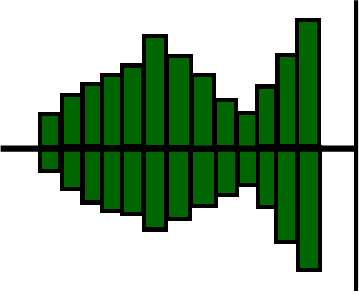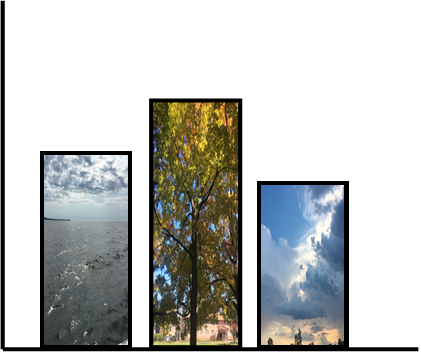Add valuable tools to your quantitative methods and decision analysis toolbox
The Quantitative Fisheries Center at Michigan State University offers online courses aimed at natural resource professionals to improve their skills in quantitative methods and decision analysis. These courses are designed to extend their prior training and provide them with skills to better address the challenges and complexities of resource management.
Current offerings:
Fish Population Dynamics
The aim of this course is to improve fundamental understanding of the critical rate functions governing changes in population abundance and biomass (i.e., growth, mortality, and recruitment) and different approaches for modeling fish populations. The course covers modern quantitative fishery analysis, which includes a mix of modeling, statistics, and population concepts. Students learn how to address “what if” scenarios with models as well as how to estimate key population parameters from data.
Dates: Monday and Wednesday from January 12 to April 26, 2026 (10:20am-11:40am each day)
Location: East Lansing, Michigan (Michigan State University) or online through Zoom
Instructor: Travis Brenden (brenden@msu.edu)
Click here to purchase the class
Project Management Using RStudio, Git, and GitHub Workshop
How to build a more robust, shareable, and reproducible research project using RStudio, Git, and GitHub.
Dates: Wednesday December 3, 10, and 17, 2025 (1-pm-3pm each day)
Location: East Lansing, Michigan (Michigan State University) or online through Zoom
Instructor: Charlie Belinsky (belinsky@msu.edu)
Click here to purchase the class
Model Uncertainty and Diagnostics Short Course
How to characterize uncertainty in maximum likelihood models and diagnose model mis-specification.
Dates: March 31 - April 2, 2026 (9am-4pm each day)
Location: East Lansing, Michigan (Michigan State University) or online through Zoom
Instructor: Chris Cahill (cahill11@msu.edu) and Travis Brenden
Click here to purchase the class
Introduction to Simulation for Decision Analysis Course
This course introduces the types of computer simulation models that are used to inform decisions about management of fish and wildlife populations. The course goal is to provide you with the knowledge you need to begin building your own models of systems that matter to you, and to use those models to inform the process of making a good decision.
Format: Asynchronous online, the course can be started any time.
Instructor: Dr. Michael Jones (jonesm30@msu.edu)
Click here to purchase the class
Programming Fundamentals Using R Course
This course introduces students to the principles of programming using the R and RStudio software packages. The course will teach students basic programming and data structures, as well as good programming practices--skills that are transferable to other languages like C++ and Python.
Format: Asynchronous online, the course can be started any time.
Instructor: Charles Belinsky (belinsky@msu.edu)
Click here to purchase the class
Advanced R: Graphing with GGPlot Course
This course introduces students to the graphing packing in R called GGPlot2. GGPlot2 is a powerful data visualization tool used to make publication-quality plots. We will cover how to create common graphs such as bar graphs, scatter plots, and histograms with the goal of creating reusable plots that are easy to modify.
Format: Asynchronous online, the course can be started any time.
Instructor: Charles Belinsky (belinsky@msu.edu)
Click here to purchase the class
Future offerings:
Maximum Likelihood Estimation Using RTMB Short Course
The course reviews concepts underpinning maximum likelihood estimation and covers applications using Template Model Builder (TMB) via the RTMB package, a software tool increasingly used in fisheries and ecology for fitting of highly parameterized nonlinear non-normal statistical models, including state-space models.
Dates: 3 full days -- dates TBD
Instructor: Chris Cahill (cahill11@msu.edu)
Fish Mortality Estimation Short Course
Dates: 3 full days -- dates TBD
Instructor: Travis Brenden (brenden@msu.edu)
Fish Recruitment and Reference Points Short Course
Estimating stock-recruitment relationships and deriving commonly used fisheries management reference points like FMSY and MSY using age-structured simulation approaches.
Dates: 3 full days -- dates TBD
Instructor: Chris Cahill (cahill11@msu.edu) and Travis Brenden
Fish Age and Growth Modeling Short Course
Dates: 3 full days -- dates TBD
Instructor: Travis Brenden (brenden@msu.edu)
Past courses:
Applied Bayesian Modeling for Natural Resource Management
This course introduces students to Bayesian modeling applications in Natural Resources. Students will learn how to elicit, fit, check and compare models under the Bayesian Paradigm in the context of common problems in natural resources using the Stan programming language. There is currently no scheduled offering of this course.
Introduction to Structured Decision Making and Adaptive Management
We explore the role of uncertainty in decision - making about renewable natural resources. Students are introduced to Structured Decision Making (SDM) and Adaptive Management (a special case of SDM), and to quantitative methods associated with them. You will learn about the importance of models and of effective stakeholder engagement. There is currently no scheduled offering of this course.
Resampling Approaches to Data Analysis
Resampling methods construct sampling distributions for statistics of interest by resampling observed data. In this course, students are taught common resampling approaches including bootstrapping and randomization/permutation testing, with heavy emphasis on different bootstrap data generating methods and different bootstrap confidence intervals. This class is being redone and will be offered as a short course in the future.
For more information:
Email the first course instructor for questions about the course content. For all other questions, email Charlie at belinsky@msu.edu.





 Print
Print Email
Email